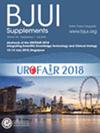晚期前列腺癌的选择性降级治疗:我们是否已经走过了一个完整的轮回?
IF 3.7
2区 医学
Q1 UROLOGY & NEPHROLOGY
引用次数: 0
摘要
本文章由计算机程序翻译,如有差异,请以英文原文为准。
Selective treatment de-escalation in advanced prostate cancer: have we come full circle?
Compelling evidence has solidified the notion of early treatment intensification in managing patients with metastatic hormone-sensitive prostate cancer (mHSPC). Landmark trials have provided Level 1 evidence for the survival benefits achieved by combining multiple agents. The efficacy of combined therapy relies not only on how treatment is intensified but also on how it is de-escalated. This underscores the importance of tailored treatment approaches, potentially involving a reduction in therapy for specific patients, to strike a balance between the benefits of hormonal treatment and its associated adverse effects. While de-escalation of therapy in mHSPC remains challenging due to limited evidence, it is recommended for elderly or frail patients, those with poor performance status, or experiencing significant toxicity. However, for patients with excellent prostate-specific antigen responses or favourable biomarkers, decisions should be personalised, weighing the potential benefits of continued treatment against the risk of long-term side effects, using risk stratification tools where appropriate.
求助全文
通过发布文献求助,成功后即可免费获取论文全文。
去求助
来源期刊

BJU International
医学-泌尿学与肾脏学
CiteScore
9.10
自引率
4.40%
发文量
262
审稿时长
1 months
期刊介绍:
BJUI is one of the most highly respected medical journals in the world, with a truly international range of published papers and appeal. Every issue gives invaluable practical information in the form of original articles, reviews, comments, surgical education articles, and translational science articles in the field of urology. BJUI employs topical sections, and is in full colour, making it easier to browse or search for something specific.
 求助内容:
求助内容: 应助结果提醒方式:
应助结果提醒方式:


